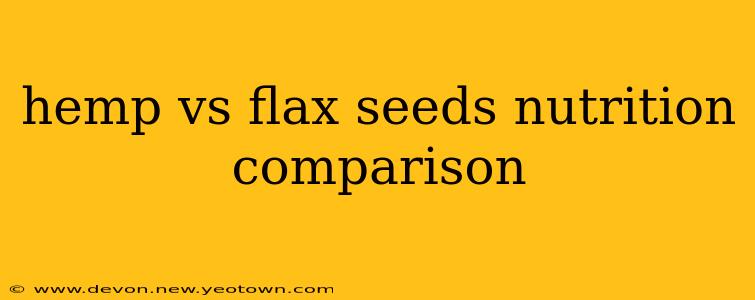For the health-conscious, hemp and flax seeds have emerged as nutritional powerhouses, both boasting impressive profiles of essential fatty acids, fiber, and protein. But which seed reigns supreme? This isn't a simple "winner takes all" scenario; both offer unique nutritional benefits, making the best choice dependent on your individual needs. Let's dive into a comprehensive comparison, exploring their nutritional differences and uncovering which seed might be the better fit for you.
Imagine two ancient warriors, each wielding a unique arsenal of nutrients, preparing for battle. In one corner, we have the robust hemp seed, known for its balanced profile and earthy flavor. In the other, the sleek flax seed, a champion of omega-3s and lignans. Let the nutritional showdown begin!
Hemp Seeds: The Balanced Contender
Hemp seeds, derived from the Cannabis sativa plant (but don't worry, they contain negligible amounts of THC), offer a remarkably well-rounded nutritional profile. They're a complete protein source, meaning they contain all nine essential amino acids our bodies can't produce on their own. This makes them an excellent addition to vegetarian and vegan diets. Beyond protein, hemp seeds are rich in:
- Healthy Fats: They provide a balanced ratio of omega-3 and omega-6 fatty acids, crucial for heart health, brain function, and reducing inflammation. This balanced ratio is a significant advantage over flax seeds, which are heavily weighted towards omega-3s.
- Fiber: Hemp seeds are a good source of both soluble and insoluble fiber, promoting digestive health and regularity.
- Minerals: They're a decent source of magnesium, iron, zinc, and phosphorus, vital for various bodily functions.
Flax Seeds: The Omega-3 Champion
Flax seeds, tiny but mighty, are renowned for their exceptionally high concentration of alpha-linolenic acid (ALA), an omega-3 fatty acid. ALA is essential for brain health, heart health, and reducing inflammation. However, our bodies don't directly use ALA; it must be converted into EPA and DHA, which are more readily utilized. While this conversion isn't always efficient, the high ALA content in flax seeds still makes them a valuable source of omega-3s. Beyond ALA, flax seeds also contain:
- Lignans: These plant compounds act as antioxidants and may offer protection against certain cancers and other chronic diseases. Flax seeds are an exceptionally rich source of lignans compared to other foods.
- Fiber: Similar to hemp seeds, flax seeds are a good source of fiber, supporting digestive health.
Hemp vs. Flax: A Nutritional Breakdown (Per 100g)
While precise values vary based on factors like growing conditions and processing, here's a general comparison:
| Nutrient | Hemp Seeds (approx.) | Flax Seeds (approx.) |
|---|---|---|
| Calories | 553 | 534 |
| Protein | 30g | 18g |
| Fat | 48g | 42g |
| Carbohydrates | 10g | 29g |
| Fiber | 10g | 27g |
| Omega-3 Fatty Acids | ~2g | ~24g |
| Omega-6 Fatty Acids | ~20g | ~6g |
| Lignans | Low | High |
Which Seed Is Right for You?
The "better" seed depends entirely on your individual needs and goals.
Choose Hemp Seeds if:
- You need a complete protein source.
- You want a balanced ratio of omega-3 and omega-6 fatty acids.
- You're looking for a versatile seed to add to various dishes.
Choose Flax Seeds if:
- You prioritize a high intake of omega-3 fatty acids (ALA).
- You're interested in the potential health benefits of lignans.
- You're looking for a high-fiber option.
Can I use both Hemp and Flax Seeds?
Absolutely! There's no reason you can't incorporate both hemp and flax seeds into your diet to reap the benefits of each. Their unique nutritional profiles complement each other, offering a broader spectrum of essential nutrients.
How to Incorporate Hemp and Flax Seeds into Your Diet?
Both seeds are incredibly versatile. You can sprinkle them on salads, yogurt, oatmeal, or smoothies. They can also be added to baked goods, or even ground into flour for added nutrition. Remember to grind flax seeds for better absorption of nutrients.
Are there any potential side effects?
While generally safe, consuming excessive amounts of either seed can potentially lead to digestive issues like bloating or diarrhea due to their high fiber content. Start with small quantities and gradually increase your intake as tolerated. Also, individuals with allergies to nuts or seeds should exercise caution.
This comprehensive comparison should empower you to make informed choices about incorporating these nutritional powerhouses into your diet. Remember, a balanced diet that includes a variety of foods is always the best approach to optimal health.

